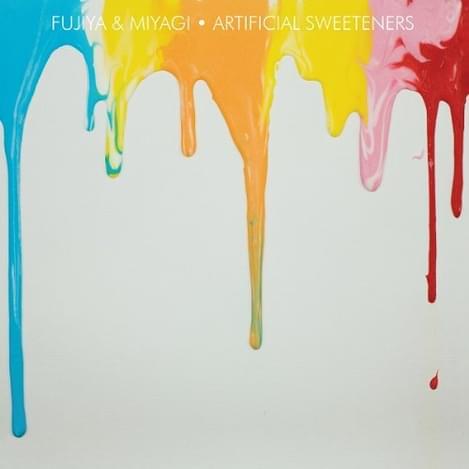Fujiya & Miyagi - Artificial Sweeteners
"Artificial Sweeteners"

The key to the Brightonians’ continued cult appeal though, is likely the cerebral approach that they take to their work; their records might ultimately turn out to resemble dance-pop, but they’re born of a fascination with the complex textures of Krautrock - the band are well-documented Can fans. This distillation of their influences into something more accessible is something they’ve continued to pursue with Artificial Sweeteners; opener “Flaws” is propelled by flickering synths and flashes of washed-out guitar, with a decidedly rudimentary beat playing second-fiddle.
This is a difficulty that the record repeatedly runs into; for a band so clearly interested in groove, they have a puzzling propensity for relegating the percussion to a status of low priority - it’s especially obvious when there’s no discernible bass line to pick up the slack, as is the case on the title track. Even when the beat does feel as if it’s doing some of the work - urging “Rayleigh Scattering” forwards, for example - it sounds tinny, and lacks punch; Artificial Sweeteners doesn’t have a great deal of low-end to it, and struggles for genuine groove as a result.
The real focus, instead, seems to be on the electronic side of things; “Tetrahydrofolic Acid” sends a plethora of eccentric, overlapping synth lines across each other to stirring effect, whilst standout “Daggers”, anchored by an (all-too-scarce) prominent bass line, is scored through with searing, effects-laden guitar. It’s also one of the only tracks on the record that doesn’t use David Best’s vocals in completely arbitrary fashion; on “Acid to My Alkaline” - a sharp reminder of how dated Friendly Fires already sound - and “Flaws”, his hushed style dips in and out at apparently random intervals, but “Daggers” - like fellow standout “Little Stabs at Happiness” - harnesses the vocals as part of its driving force.
The interesting thing about Fujiya & Miyagi is that they clearly have the potential to cross over, at least into the accepted alternative mainstream, despite taking their cues from a pretty abstruse selection of artists. That they didn’t manage to do so five or six years ago, when this particular sound was de rigeur, probably speaks to their appetite for experimentation and creative freedom, but the lack of obvious progression on Artificial Sweeteners leaves them in a kind of purgatory; it’s bound to please their existing fans, but hardly seems likely to win them many new ones.
Get the Best Fit take on the week in music direct to your inbox every Friday

Tunde Adebimpe
Thee Black Boltz

Julien Baker & TORRES
Send A Prayer My Way

Bon Iver
SABLE, fABLE





